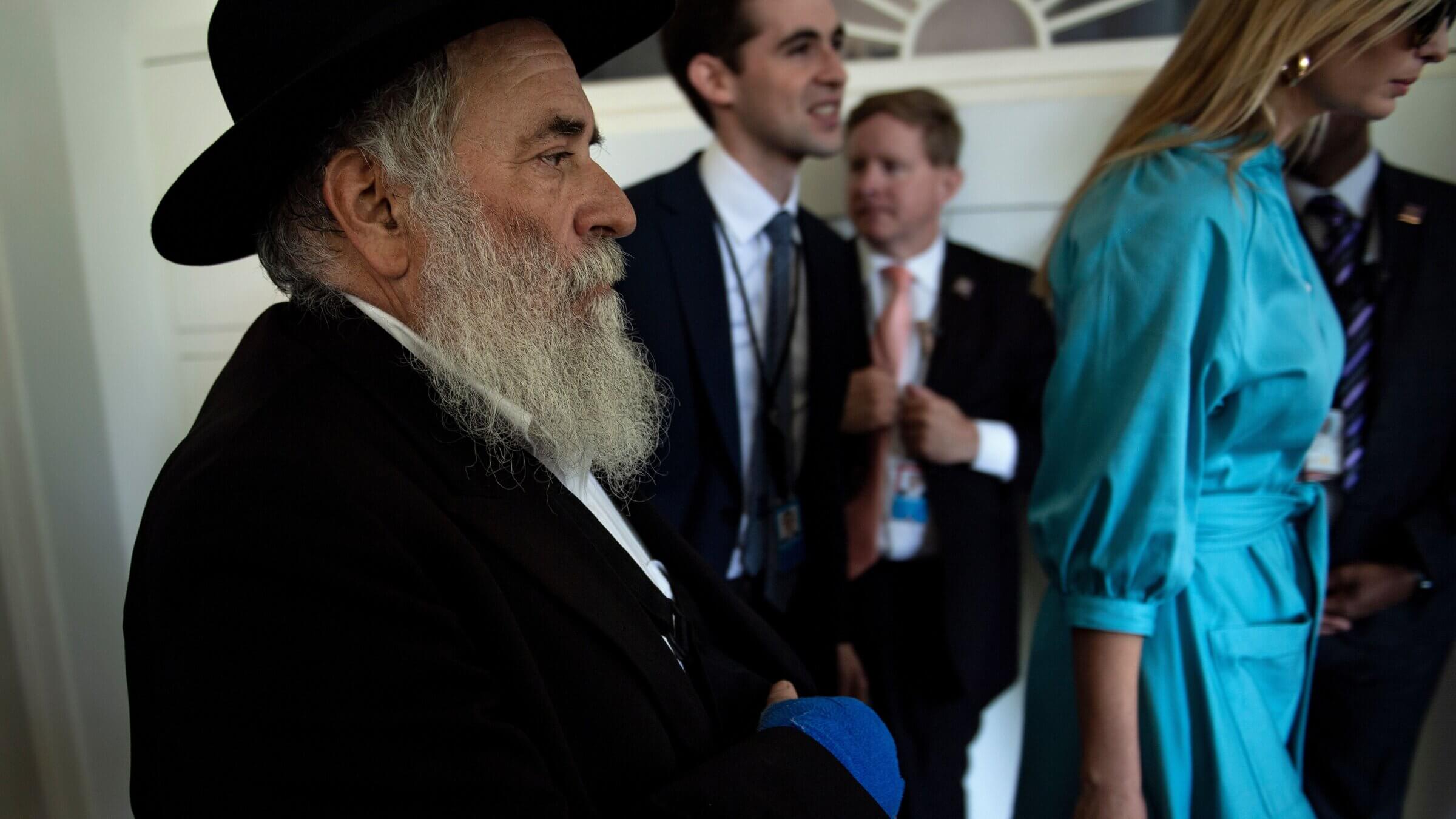Yisroel Goldstein was sentenced to 14 months for fraud. He’s home after three.
Due to the pandemic, the ex-Chabad of Poway rabbi may end up serving the rest of his sentence at his hilltop mansion.

Yisroel Goldstein of the Chabad of Poway at a White House event in 2019. (Brendan Smialowski / AFP via Getty Images)
Yisroel Goldstein, the Chabad rabbi who began a 14-month prison sentence in February after pleading guilty to tax and wire fraud charges, is out early.
Reached by phone Monday, an operator at FCI Otisville, a medium-security federal prison in New York where the rabbi had been incarcerated, said that Goldstein had been “on furlough” — an interim state of home release — since May 5.
And because the federal prison system is trying to control the spread of COVID-19, Goldstein may be eligible to serve the rest of his sentence in home confinement.
His former community is apparently aware of his return. Three former congregants of Chabad of Poway, the synagogue Goldstein founded, said they had heard from current congregants that the rabbi was sent home as part of a pandemic-related program aimed at reducing the incarcerated population to mitigate spread of COVID-19.
They described Goldstein’s return to the San Diego area as an open secret among current and former Chabad of Poway congregants.
“I was just shocked when I heard,” said Phil Raimi, a former congregant who said he left the synagogue after nearly three decades because of the scandal. “For what he put the community through the last few years, it’s so unconscionable.”
Raimi said Goldstein was rumored to be staying at his 8,000 square-foot home in Poway.
A man who answered Goldstein’s cell phone on Thursday initially confirmed that he was Rabbi Yisroel Goldstein. But after learning he was talking to a reporter, the man said, “I’ll let him know” — implying that he was not the rabbi — and hung up the phone. No one answered subsequent calls and text messages.
Goldstein’s lawyer, Benjamin Coleman, declined to comment.
Emery Nelson, a spokesman for the bureau, said in a June 9 email that the agency sometimes transfers inmates to their homes “on furlough” while they are being considered for home confinement, and that the online inmate locator in such circumstances would continue to list those inmates as in the facility. As of Monday, it indicates that Goldstein is at Otisville.
Goldstein, 60, first became a national figure after the Chabad synagogue, located about 20 miles north of San Diego, was attacked by an antisemitic gunman on the last day of Passover in 2019. A congregant, Lori Gilbert-Kaye, was killed in the shooting, and Goldstein, who lost a finger, was one of three injured.
As he was feted in the press and by the White House, Goldstein was already cooperating with FBI and IRS investigators who unraveled his multimillion-dollar tax evasion and grant fraud schemes. The wrongdoing dated back decades and involved more than 30 co-conspirators — including the rabbi of Chabad of University of California, San Diego, and Goldstein’s brother, who was sentenced in March to seven months in federal prison.
Much of Goldstein’s $2.8 million grift involved sham donations to the synagogue. He would recruit donors, refund 90% of their gifts, keep 10% for himself and sign a tax writeoff for the donor for the full amount.
He also defrauded federal grant programs. In a lawsuit against Chabad of California, families of the injured question whether a security grant the synagogue got months before the shooting was misused — and could have blocked the gunman from entering. (An attorney for the victims did not immediately return a request for comment.)
Prosecutors had recommended probation for the rabbi, citing his cooperation with the investigation. But Judge Cynthia Bashant, who has presided over all eight cases connected to the scheme, went further.
“You dragged so many congregants down with you,” Bashant told Goldstein at his Jan. 4 sentencing hearing. “Many of those individuals thought they were committing the offenses to help Chabad.
“But really it was just to benefit you — for your personal benefit,” she added. “And I can’t ignore that fact.”
On Friday, Bashant sentenced the Chabad of UC San Diego rabbi, Yehuda Hadjadj, to three years’ probation for his role in the scheme. (Unlike Goldstein, who pocketed his grifted funds, Hadjadj used a donation scheme to fund synagogue operations.
Goldstein and Hadjadj have been expelled from the Chabad organization by the movement’s international headquarters. Goldstein’s son, Mendel Goldstein, now runs Chabad of Poway, upsetting many former congregants, who started a breakaway congregation that meets in a congregant’s backyard.
The home confinement program for federal inmates dates back to the beginning of the COVID-19 pandemic, when prisons across the country were beset by outbreaks.
In March 2020, former Attorney General William Barr directed the Bureau of Prisons to maximize the use of home confinement at facilities where COVID-19 was “materially affecting operations.” Like most federal prisons, FCI Otisville falls into that category.
Per Barr’s guidance, which was extended with little modification by Attorney General Merrick Garland, eligibility for home confinement depends on several factors, including the nature of the crime committed, risk to the public, and the inmate’s age and vulnerability to COVID-19.
In January, Garland ruled that the bureau was not required to reimprison inmates who had been released to home confinement when the pandemic state of emergency ends.
Steve Arnold, Chabad of Poway’s security director, declined to comment on Goldstein other than to say that the rabbi was “banned from the premises.”















